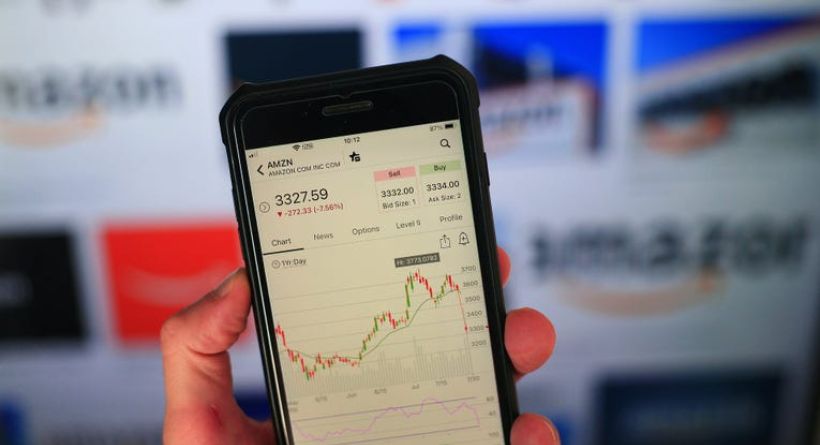Until recently, the thought of handling stocks and shares from your mobile device — essentially, having a dealing room in your pocket – would have looked fantastical.
Smartphones, however, are making this a reality. Private investors are increasingly embracing trading applications to manage whole portfolios rather than simply execute a single transaction.
Whether you’re new to investing or a seasoned stock market trader, here’s a look at the emergence of trading apps and how to choose one that’s right for you.
Which trading app should I pick?
Keeping the cost of trading and investing to a low will increase the profits on your underlying assets.
However, like with so many financial choices, there is no one-size-fits-all solution when it comes to selecting a trading software. Much of your selection will be influenced by what you expect from a service.
Aside from fees, there are a few other things to consider if you want to get the most out of your trading app experience. These are some examples:
- How easy do you find the app to use?
- What investments are you looking to trade? Shares, funds, or more complex investments?
- Is it possible to practise trading or trade digitally before investing if you’re new to investing?
- Aside from trade fees, what additional administrative fees does the app levy?
- Is there a minimum investment required?
- Can you use the app to trade tax-free through a stocks and shares ISA?
- Is your app governed by the Financial Conduct Authority (FCA) in the United Kingdom?
- Are there any additional bonuses or rewards?
Trading apps for various scenarios
The trading app industry is becoming more congested. Here is a list of applications that address a wide variety of settings, from rookie to advanced investors.
1) eToro – good for beginners and social
eToro bills itself as a “bridge between the old and new worlds of investing,” claiming to be “the only location where investors may hold conventional assets like equities and commodities alongside ‘new’ assets like the cryptocurrency Bitcoin.”
The app delivers a good mobile experience and, like many of its competitors, offers zero-commission deals.
Users may also follow and even mimic the trades of genuine investors with established track records on eToro. The FCA regulates.
2) Freetrade – good for easy investing and guides
The standard service from Freetrade includes commission-free trading and access to big and mid-cap stocks in both the UK and the US, as well as initial public offerings (IPOs) and special purpose acquisition businesses (SPACs).
It also offers restricted access to a number of businesses listed on the German, Finnish, and Dutch stock exchanges.
Freetrade Plus costs £9.99 per month but provides a far broader range of investing options, including all other London-listed shares as well as access to all other European shares. The FCA regulates.
3) Fidelity Personal Investing – good for funds
Fidelity offers nearly 2,500 funds, as well as shares in the FTSE 100, FTSE 250, FTSE All-Share, and FTSE AIM 100. Investment trusts, exchange-traded funds (ETFs), and certain Irish shares are also options.
A user may connect family members’ accounts to view everything in one location, and a Watchlist records the success of up to 50 assets at once. The FCA regulates.
4) Trading212 – good for practising trades using virtual money
Trading 212 provides unlimited commission-free trades on over 10,000 stocks and ETFs from the United Kingdom, United States, Germany, France, Spain, the Netherlands, and other markets.
Trading 212 also provides over 3,000 contracts for difference (CFDs) on stocks, currency, gold, oil, and indices for individuals searching for more complex investments.
Users may begin by creating a free, lifelong practise account with virtual money. The FCA regulates.
5) IG – good for more experienced investors
Users may trade on more than 17,000 worldwide markets, including stocks, indices, options, and commodities, via IG.
It includes interactive charts, news, trade alerts, and real-time signals. Users may spread bet or trade CFDs on commodities, and options trading on a variety of assets is offered on a daily, weekly, and monthly basis. The FCA regulates.
Getting started
The days of “calling one’s broker” while wanting to invest in the stock market are long gone.
Most investors who wish to buy and sell stocks, establish a portfolio of investment funds, or trade complicated derivatives like “contracts for difference” now use an online dealing account.
Over the last two decades, investment platforms representing some of the greatest names in stockbroking and fund management have responded to this requirement, mostly via desktop or laptop-oriented offerings.
Private investors, on the other hand, have shifted away from desktop trading and toward mobile trading in recent years.
Two things have aided in the acceleration of this occurrence. First, smartphones are becoming more capable, and second, the number of share trading applications is expanding.
The numbers are crucial. According to App Radar, the top ten UK investing apps received an anticipated 3.1 million Android downloads on Google Play in 2020/21.
App Radar does not track iOS stats, which include Apple users. However, it claims that the proportion between Android and iOS downloads is around 50/50. Taking this into consideration, App Radar believes that there are currently about nine million users in the UK who use trading applications.
Rise of apps
Some of the most recent investment trading services provided by ‘neo-brokers’ are only accessible via a mobile app.
To keep up, conventional desktop investing platform providers have created their own trading applications for users to utilise.
Hargreaves Lansdown, the biggest conventional UK platform, claims its app will have approximately 700,000 users by the end of 2021. It claims that more than a quarter of a million customers use its app on a regular basis.
AJ Bell, one of its competitors, announced earlier this year the introduction of Dodl, an app geared at younger users. One of Dodl’s primary benefits is that investors will be able to purchase shares “commission-free.”
Commission-free trading has become a big selling feature for trading applications that earn their money via other costs. More information on trading costs in general may be found below.
Charges, on the other hand, should not be the only emphasis of an investing app user.
Trading costs
The investing landscape is packed with variable fees and levies that vary from provider to provider, making it difficult for investors – whether app-based or desktop-based – to determine what they will really pay.
Some providers charge a fixed cost per transaction when buying and selling shares. Others arrange their fees to favour customers who trade the markets on a regular basis.
Users may also be charged according on the amount of money they invest. Accounts given by more established platform providers may have a monthly membership or admin cost.
If you want to acquire international shares, for example, to obtain exposure to US tech firms priced in dollars, you’ll almost certainly be paid a currency cost.
Meanwhile, if you’re an infrequent trader – say, you go a year without trading – your account may incur ‘inactivity’ fees.
Several software developers tout their ‘commission-free’ trading status. It’s a welcome and growingly popular alternative in the financial world. But keep in mind that just because trades are free of fees doesn’t mean your account will be completely free of costs.
Brokers generate money in various ways, such as withdrawal fees and currency exchange costs.
Determine your investment style before joining up for a certain investing app. Knowing how much you want to spend, how often you intend to trade, and which markets will be your major focus will help you choose the finest and most cost-effective software for your requirements.
If you want to protect your assets from taxation, make sure your provider offers a stocks and shares ISA – a wrapper that permits an annual allocation of £20,000 in shares and funds to grow tax-free.
Beware ‘indiscriminate’ trading
The opportunity to trade rapidly and, if you pick the proper supplier, with little or no cost are two of the key benefits of investing through an app.
On the surface, this seems to be a winning mix, with the possibility for increased investment returns on your portfolio. However, according to research from Frankfurt’s Leibniz Institute, it’s still vital to tread carefully, even when you have the investment power of a sizable dealing room in the palm of your hand.
According to the experts, a shift to app-based trading may do investors more financial damage than gain if they are not cautious.
Over a period of many years, the researchers followed the transactions of 15,000 clients of two big German retail banks. They observed that when users used a mobile app to conduct transactions, they were 8% more likely to acquire “riskier lottery-type equities” than when they used a computer.
Deals made using apps were also 12% more likely to be for “previous winners,” or companies that had recently surged. “Our results advice against the indiscriminate adoption of cellphones as the primary technology to improve access to financial markets,” the researcher said.







